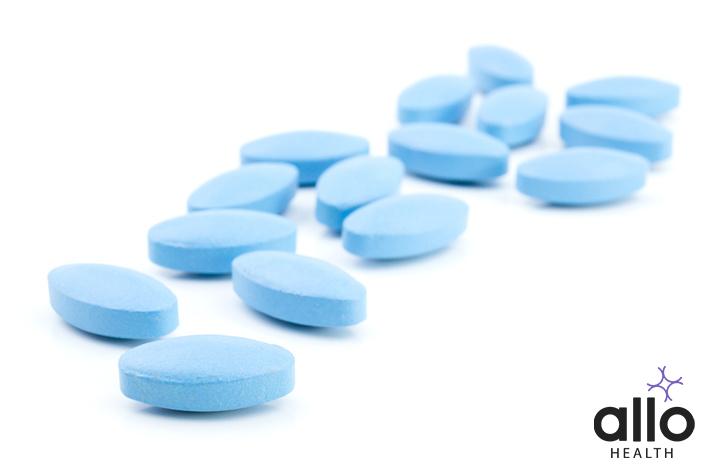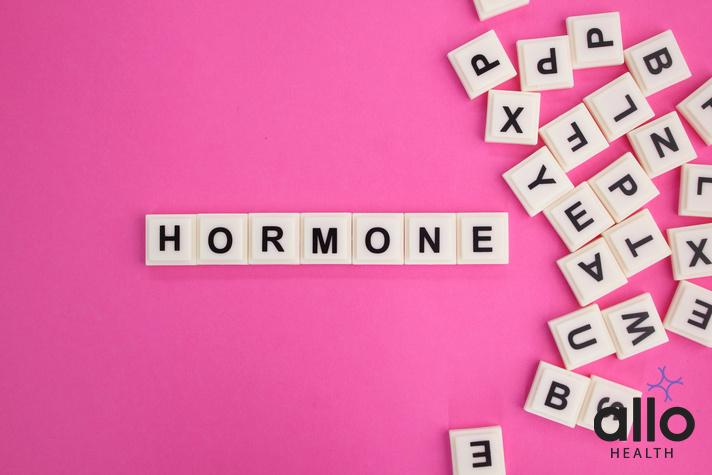Exploring HCG Dosage for Erectile Dysfunction Treatment

Allo Health is dedicated to personalized well-being, offering support and trusted information tailored to individual health goals. The platform emphasizes human-generated content, led by a distinguished medical team of experts, including physicians and sexual health specialists. Their commitment to credibility involves rigorous fact-checking, authoritative research, and continuous updates to ensure accurate, up-to-date information. Allo Health's unique approach goes beyond conventional platforms, providing expert-led insights and a continuous commitment to excellence, with user feedback playing a crucial role in shaping the platform's authoritative voice.

Dr.Sushma.V completed MBBS degree from BGS GIMS,bangalore
Why This Was Upated?
Our experts continually monitor the health and wellness space, and we update our articles when new information became available.
Updated on 02 February, 2024
- Article was updated as part of our commitment to diversity, equity, and inclusion.

"The following blog article may discuss medical treatments and interventions. However, it is important to note that the information provided is for general educational purposes only and should not be considered as a substitute for professional medical advice, diagnosis, or treatment. Always seek the guidance of a qualified healthcare professional for personalized medical advice.
Book consultation
Medical treatments are complex and should be tailored to individual circumstances. The information presented in this blog may not be applicable to everyone, as each person's medical condition, history, and needs are unique. Only a qualified healthcare professional can evaluate your specific medical situation, consider relevant factors, and provide appropriate recommendations for diagnosis, treatment options, and monitoring.
It is crucial to note that self-diagnosis, self-medication, or relying solely on the information provided in this blog for treatment decisions can have serious health consequences. "
Erectile dysfunction (ED) is a common condition that affects millions of men worldwide. It refers to the inability to achieve or maintain an erection firm enough for sexual activity. While there are several treatments available for ED, not every medication works for every patient. For those looking for a new solution, HCG may provide the answer. In this article, we will discuss the benefits of HCG dosage for the treatment of ED, including what it is, how it works and much more.
What is HCG and How Does it Work for Erectile Dysfunction?
- HCG (Human Chorionic Gonadotropin):
Hormones are produced by the placenta during pregnancy.
Traditionally used for fertility treatment and more recently as a weight loss aid.
- HCG and Erectile Dysfunction (ED):
Potential benefits in treating ED.
Increases testosterone levels in men, addressing hormonal imbalances.
Potential improvement in blood flow to the penis.
Caution and Supervision:
Should only be used under the guidance of a healthcare professional.
Potential side effects include headaches, fatigue and mood changes.
- Comparison with Other ED Medications:
Natural hormones, potentially cause fewer side effects than synthetic medications.
Requires injection amounts, which may be less convenient.
Not FDA-approved for ED, potential difficulty in finding a provider.
Dosage Recommendations:
Dosage varies based on age, weight and health.
Typically administered through HCG injections, 500-1000 units, two to three times a week.
Treatment duration ranges from 3-6 months.
- Long-term Effectiveness of HCG for ED:
Promising results in improving erectile function and overall sexual health.
May not be a cure and effectiveness varies among individuals.
Consideration of other treatment options based on individual needs.
- Managing Side Effects:
Mild side effects include headaches, mood changes, weight gain and injection site swelling.
Severe side effects are rare but may include blood clots or allergic reactions.
Communication with healthcare providers is essential for adjusting additional dosage and managing side effects.
- Combining HCG with Other Treatments:
Potential benefits of combining HCG with other therapies.
Guidance from healthcare providers is crucial to determine the best approach.
Lifestyle changes and communication with a partner also play a role.
- Obtaining HCG for ED Treatment:
Currently not FDA-approved; off-label use may be prescribed by some providers.
Not a first-line treatment, but consideration after other options.
Critical to understand potential risks and benefits before starting treatment.
- Role of Hormone Imbalance in ED and HCG’s Impact:
Testosterone deficiency linked to ED; HCG helps stimulate testosterone production.
HCG may also address imbalances in other hormones contributing to ED.
Importance of professional guidance for safe administration.
TRT(Testosterone Replacement Therapy can often lead to a reduction in sperm production and testicular size due to the suppression of the hypothalamic-pituitary-gonadal (HPG) produced by the anterior pituitary gland.
- Hematocrit Level:
When using HCG as part of testosterone therapy, monitoring hematocrit levels is crucial.
HCG can stimulate red blood cell production, potentially leading to an increase in hematocrit levels.
increases in hematocrit levels can increase the risk of blood clotting and other cardiovascular issues, so regular monitoring and dose adjustments may be necessary to maintain a healthy hematocrit range.
- Common Misconceptions:
Effective in men with normal production of testosterone levels, not just hypogonadism.
Not no guaranteed cure and dosage precision is crucial.
Requires professional assessment for suitability and safety.
- Future of HCG as a Treatment Option:
Potential expansion into other men’s health issues.
Potential advantages include fewer side effects compared to some existing medications.
HCG vs Other Erectile Dysfunction Medications: Pros and Cons
Advantages of HCG:
- Natural Hormone Production:
HCG is a natural hormone produced by the body.
Less likely to cause side effects compared to synthetic medications.
- Potential for Long-Term Benefits:
HCG may offer long-term benefits even after the treatment concludes.
Drawbacks of HCG:
- Inconvenience of Injections:
Requires administration through injections, which might be inconvenient for some patients.
- FDA Approval Status:
Not FDA-approved for ED treatment, potentially limiting accessibility.
Finding a healthcare provider willing to prescribe it could be challenging.
- Effectiveness Variation:
Effectiveness may vary among individuals.
- Potential Cost Considerations:
May not be covered by insurance, potentially making it a more expensive option compared to other treatments.
Comparison with Other ED Treatments:
Oral Medications (Viagra, Cialis, Levitra):
- Pros:
Convenient oral administration.
Well-established, widely prescribed, and FDA-approved.
- Cons:
Synthetic nature may lead to adverse side effects.
Short-term effects – not known for providing long-term benefits.
Penile Injections:
- Pros:
Direct delivery for faster results.
Suitable for patients not responding well to oral medications.
- Cons:
Invasive and may cause discomfort.
Requires precision and skill in administration.
Vacuum Pumps:
- Pros:
A non-invasive method to induce an erection.
No need for medications.
Cons:
May be less spontaneous than other methods.
Some find it cumbersome or uncomfortable.
Consideration for Patient Preferences:
The choice between injection inconvenience, oral medication ease, or non-invasive methods.
Patient preference may play a significant role in selecting the most suitable treatment.
Professional Guidance:
Decisions regarding ED treatment should be made under the guidance of a healthcare professional.
Consideration of individual health, preferences and potential risks is crucial in determining the most common treatment.
Dosage Recommendations for HCG in Treating Erectile Dysfunction
- Individualized Approach:
Tailored based on age, weight, and health.
Typically 500-1000 units, injected 2-3 times weekly.
- Thrombotic events:
Such as blood clot formation, are a potential but rare adverse side effect associated with the use of HCG.
While HCG is generally considered safe when used under medical supervision, especially in the context of testosterone therapy, there have been isolated reports of thrombotic events in individuals using HCG.
- Supervised Administration:
Strictly under healthcare provider supervision.
Self-administration discouraged.
- Treatment Duration:
Spans 3-6 months, subject to individual response.
- Side Effects Discussion:
Pre-treatment consultation is essential.
Common side effects: headache, irritability, fatigue.
- Professional Guidance:
Providers evaluate benefits vs risks.
Ongoing monitoring and potential adjustments.
- Patient Education:
Understand potential side effects.
Regular follow-ups for progress assessment.
- Holistic Consideration:
Balancing HCG benefits with other options.
Collaborative decision-making for informed treatment.
The Effectiveness of HCG as a Long-term Solution for Erectile Dysfunction
In addition to improving erectile dysfunction, HCG may also help increase sperm count and improve overall sexual health. It is therefore possible that HCG may provide long-term benefits for men suffering from ED beyond just the period of treatment.
However, it is important to note that HCG is not a cure for ED and may not work for everyone. It is also not recommended for use in men with certain medical conditions, such as prostate cancer or a history of blood clots. Therefore, it is important to consult with a healthcare provider before starting HCG treatment for ED.
Managing Side Effects of HCG Treatment for Erectile Dysfunction
- Common Side Effects:
Headaches, mood changes, and injection site swelling.
Generally mild, self-resolving within a few days.
- Severe Side Effects Awareness:
Severe reactions like allergies or breathing difficulties require immediate medical attention.
- Communication with Healthcare Providers:
Essential to report any experienced side effects promptly.
Allows for professional evaluation and potential adjustments.
- Adjustments for Minimization:
Dosage requirements or frequency adjustments may be recommended.
Tailoring treatment to minimize side effects.
- Self-Management Steps:
Over-the-counter pain relievers for headaches.
Ice application to the injection site to reduce swelling.
- Active Role in Health:
Patients play a proactive role in managing side effects.
Communication with healthcare providers fosters a collaborative approach to treatment.
- Balancing Treatment Benefits:
Adverse Side effects, when managed effectively, allow patients to benefit from HCG treatment.
Timely reporting and adjustments contribute to a more comfortable and successful treatment experience.
- Synergistic Approach:
HCG enhances testosterone; combining it with lifestyle changes like exercise and stress reduction may boost effectiveness.
- Hormone Therapies:
Some healthcare providers recommend combining HCG with testosterone replacement therapy for added benefits.
- Professional Guidance:
Essential for a safe approach; only under healthcare provider supervision.
Tailored based on individual needs and medical history.
Adherence to Recommendations:
Strict adherence to recommended dosages and frequencies minimizes potential side effects.
- Not a Standalone Solution:
HCG is a part of a broader strategy; not a sole cure for ED.
Underlying health issues and lifestyle changes need attention.
- Collaborative Care:
Combining HCG with other treatments requires collaboration with healthcare providers.
A comprehensive strategy considering physical, lifestyle and emotional factors maximizes effectiveness in ED management.
How to Obtain HCG for Erectile Dysfunction Treatment
Currently, HCG is not FDA-approved for the treatment of ED. However, some providers are willing to prescribe it “off-label”, meaning that it is being used for a purpose that it is not currently approved for. It is important to seek out a qualified healthcare provider who has experience with HCG to ensure that it is being used safely and effectively.
It is also important to note that HCG is not a first-line treatment for ED. Other treatments, such as oral medications or penile injections, may be more effective and have fewer risks. HCG should only be considered as a treatment option if other treatments have failed or are not appropriate for the individual.
Additionally, it is crucial to understand the potential side effects of HCG. Common side effects include headache, fatigue, and irritability. More serious adverse health effects, such as blood clots or allergic reactions, are rare but can occur. Patients should discuss the risks and benefits of HCG with their healthcare provider before starting treatment.
The Role of Hormone Imbalance in Erectile Dysfunction and How HCG Can Help
As previously mentioned, testosterone plays a crucial role in male sexual function. When a man has low testosterone levels, it can lead to a decrease in libido and other sexual problems like ED. HCG can help stimulate the testes to produce more testosterone, which can help alleviate the symptoms of ED.
Additionally, several other hormonal imbalances can contribute to ED. These imbalances can include low levels of thyroid hormone, cortisol, and prolactin. HCG may also help to balance these hormones, leading to improved sexual function and overall health.
It is important to note that hormone imbalances can also be caused by certain medications, such as antidepressants and blood pressure medications. These medications can interfere with the body’s natural hormone production, leading to ED and other sexual problems. In these cases, HCG may be a viable treatment option to help balance hormone levels and improve sexual function.
It is also worth mentioning that HCG therapy should only be administered under the guidance of a healthcare professional. While HCG can be effective in treating ED and other hormonal imbalances, it is important to ensure that it is being used safely and appropriately.
Common Misconceptions of HCG Treatment for Erectile Dysfunction
One of the most common misconceptions about HCG treatment for ED is that it is only effective in men who have low testosterone levels. While HCG is certainly effective in treating hypogonadism, it may also benefit men who have normal testosterone levels but still experience ED.
It is also important to note that HCG is not a “miracle cure” for ED, and may not work for every patient. As with all treatments, it is important to consult with a qualified healthcare provider to determine if HCG is right for you.
Another important factor to consider when using HCG for ED treatment is the dosage. Too much HCG can have the opposite effect and lead to decreased testosterone levels and worsened ED symptoms. It is crucial to work with a healthcare provider to determine the appropriate dosage for your individual needs.
The Future of HCG as a Treatment Option for Erectile Dysfunction
As more research is conducted, the future of HCG as a treatment option for ED looks promising. It may become a more widespread treatment option in the future.
Additionally, there may be other potential uses for HCG in men’s health. For example, some studies have found that HCG may help stimulate sperm production in men who have low sperm counts. As research continues, we may discover even more potential benefits of HCG for men’s health.
One potential benefit of using HCG as a treatment for ED is that it may have fewer side effects than other medications currently on the market. For example, some men experience headaches, flushing, or other uncomfortable side effects when taking oral medications for ED. HCG injections, on the other hand, maybe better tolerated by some men.
Another advantage of using HCG for ED is that it may be more effective for certain types of ED. For example, some men with ED have low testosterone levels, and HCG may help to increase in testosterone levels. This could make it a more effective treatment option for these men than other medications that do not address the underlying hormonal imbalance.
Conclusion
HCG is a natural hormone that has shown promise in the treatment of ED. By increasing testosterone levels and addressing underlying hormonal imbalances, HCG may provide a safe and effective alternative to traditional ED treatments. While it is important to consult with a qualified healthcare provider before starting any new treatment, HCG may be the solution that many men have been searching for.
It is important to note that HCG should only be used under the guidance of a healthcare professional. While it is a natural hormone, improper use or dosing can lead to negative side effects. Additionally, HCG should not be used as a standalone treatment for ED, but rather as part of a comprehensive treatment plan that may include lifestyle changes and other therapies.
Most Asked Questions
-
Is HCG FDA-approved for the treatment of ED?
No, HCG is not FDA-approved specifically for ED treatment. It is often used off-label by some healthcare providers.
-
How does HCG work to treat ED?
HCG increases testosterone levels in men, addressing hormonal imbalances, and may potentially improve blood flow to the penis.
-
What are the potential side effects of HCG treatment for ED?
Common side effects may include headaches, fatigue, mood changes, and injection site swelling. Severe side effects like blood clots or allergic reactions are rare but possible.
-
Is HCG a long-term solution for ED?
While HCG has shown promising results in improving erectile dysfunction and sexual health, it may not be a cure, and its effectiveness can vary among individuals.
-
Can HCG be combined with other ED treatments?
Yes, combining HCG with other therapies, under professional guidance, may enhance its effectiveness in managing ED. This can include lifestyle changes and hormone therapies like testosterone replacement therapy.






































